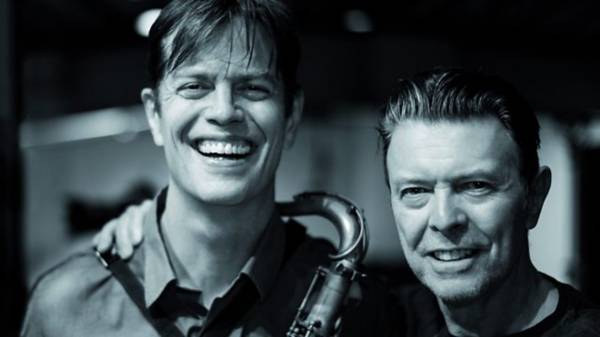Two days after the release of Blackstar in January 2016 David Bowie was dead. But what was Bowie’s artistic last will and testament proved a new dawn for Donny McCaslin, the New York jazz saxophonist whose group backed Bowie on the album. Suddenly he and his band were catapulted to a previously improbable notoriety.
It was the famed band-leader and composer Maria Schneider – with whom Bowie was about to collaborate on a version of Sue (Or in a Season in Crime) for the compilation Nothing Has Changed – who took Bowie to hear McCaslin’s group at a New York bar.
“I didn’t meet him,” says McCaslin of that night. “I saw him out of the corner of my eye, but tried not to think about it much for obvious reasons: trying to just stay focused on the music. About a week later I met him for the first time at this [Sue] rehearsal, over the course which he asked me for my contacts and said a couple of really lovely things about the gig.”

Initially Bowie suggested they might work together on two or three songs. McCaslin replied that they were game for just as much as he wanted to do, and that became the whole album.
Prior to this McCaslin, while aware of Bowie’s hits, was hardly a devotee, so decided to brush up on the singer’s back catalogue. But when he told Bowie the singer dissuaded him, saying, “Oh, that’s old. I’m into some different stuff now.” McCaslin realised he and his colleagues were being hired to be themselves, not to reproduce the past, so he stopped listening and only went back to Bowie’s discography when Blackstar was finished.
Recording began a year before Bowie died, and McCaslin is respectfully reticent about discussing the star’s health during this time. “I knew something was going on but it’s still hard for me to talk about,” he says. “It’s so personal. But what I would say is that whatever he was dealing with health-wise, it never affected what was happening in the studio. Wherever he was at with whatever was going on, when he walked in the door until the time he left he was totally present, totally focused, totally engaged in everything that was going on. And when he got up to sing or play guitar or both, he was totally en pointe.”
Blackstar went on to win five Grammy Awards, with McCaslin accepting two of them on what he describes as “an emotional day”. “It changed my life, working with him,” he says, “and that’s manifested itself in more opportunities to perform with my group, which has been a dream of mine all along, so I’m really grateful to him.”
If Blackstar bears the stamp of McCaslin’s group, their own Beyond Now album, recorded just after Bowie’s death, carries the latter’s unmistakable influence, including covers of two his songs. “We were talking in the band about how we could pay tribute to him,” says McCaslin, “and [keyboardist] Jason [Linder] suggested trying Warszawa [from Low], and it felt great. It was just such an emotional time and I was grateful to have an opportunity to play his music, but especially that song was a way to really channel a lot of those feelings into a musical context.”
If Beyond Now shares some of Blackstar’s darkness it seems this was catching. McCaslin recounts the story of Maria Schneider telling Bowie that since she’d been working with him her composing had been getting much darker. Bowie apparently beamed and said, “I see that my work here is done!”
Donny McCaslin Group, the Basement, May 31.
Six Key Bowie Collaborators
1 Tony Visconti: producer, bassist, backing singer and sounding-board on 13 albums including the classics Low, Heroes and Blackstar.
2 Mick Ronson: electric guitarist who helped define the early Bowie sound, his nine albums including Hunky Dory, Ziggy Stardust and Aladdin Sane.
3 Carlos Alomar: rhythm guitarist on 12 albums and co-writer of some songs including Fame, Bowie’s first US #1 hit.
4 Brian Eno: keyboards, treatments and co-composer who was crucial in Bowie’s pivot towards the moody, atmospheric “Berlin Trilogy” of Low (for which he co-wrote Warzawa), Heroes and Lodger.
5 Robert Fripp: guitarist who only played on two albums, but his contribution to the anthemic Heroes is a defining element in the canon.
6 Nile Rodgers: producer, arranger and guitarist who put a coat of varnish on 1983’s Let’s Dance album that made it Bowie’s biggest seller.